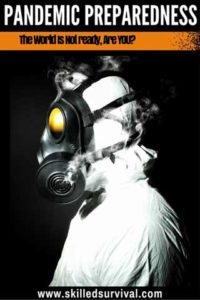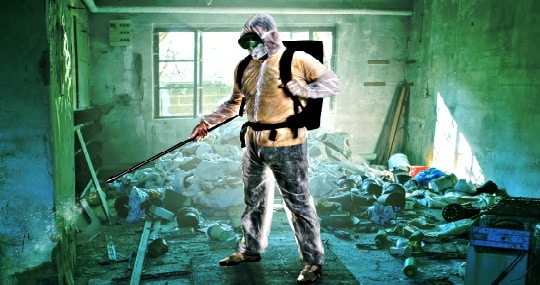Today I’ve got something incredibly important to share…
A Complete Pandemic Guide For Small Groups and Individuals
Because too many of us feel like the next outbreak is at least decades away…
But Viruses don’t play by those rules!
And human’s keep messing around with bioengineering.
So the next outbreak is likely sooner rather than later.
All it takes is one mistake for all hell to break loose.
That’s why we all must prepare for the next pandemic NOW.
Brief Pandemic History Lesson
The stench of death hung heavy in the air.
Piles of decaying bodies were tossed onto carts.
Hauled away for incineration.
Doctors in long spooky masks and flowing black robes visited homes.
But could do little to prevent infection.
Friends, family, and neighbors died horrible deaths at the hands of this disease.
And it was only a matter of time before the Black Death got you too.
It was the same with everyone:
- Painful bumps and tumors would spread quickly from groins and armpits.
- Black and purple splotches then appeared on limbs as they got sicker and sicker.
- Finally, blood began gushing uncontrollably from their noses – Black Death’s final symptom.
And as if this wasn’t bad enough, the world’s social order collapsed after this pandemic.
Looters ran rampant, and lawlessness spread as families and human decency abandoned each other in a terrible panic.
Death was on the streets and in the air.
The Black Death took hundreds of millions of lives in Europe between 1346 and 1353.
Since then, the world has experienced eve more recent pandemics, such as:
- The 1918 Spanish Flu Pandemic
- The recent Covid 19 Pandemic
Every few decades, a new viral or bacterial infection rears its ugly head and rattles the global sense of security.
Swine flu, HIV Aids, and Ebola are all recent scares that, while relatively contained, are clear reminders of the horrors of widespread uncontrolled global pandemics.
Since the black plague, society has invented new technologies to help combat the spread of pandemic diseases.
Community Pandemic Preparedness
Reaching out to your community may at first seem counter-intuitive.
Why would you reach out to your community when talking about a highly contagious disease?
Shouldn’t we avoid contact with others?
But at this stage, we are discussing preparedness (before the disaster) and not survival (after the disaster).
Once a pandemic sets in, you will want to limit your exposure to others.
So in the meantime, gather the Home Owners Associations, assemble the town hall meetings, and rally the troops!
You are safest when your community takes the necessary measures to prevent the spread of contagious diseases.
It’s time to plan for the worst.
Preparing at a wider community scale can do wonders to limit the spread of a pandemic locally. I
f a neighborhood or town can work together to create a simple neighborhood quarantine, the chances of surviving a pandemic increase dramatically.
Agree To Avoid Community Hubs
Large congregation areas and travel hubs (i.e., bus stops, train stations, airports, churches, sporting events, etc.) are the most dangerous points of disease transmission.
Agree with your community to avoid these places in the event of an uncontrolled spread; it will significantly decrease the chances of mass contamination.
Agree To Limit Travel
When a nasty disease spreads quickly, it’s time to limit travel—no long road trips or school field trips.
You don’t want to catch the disease and spread it even further.
Put A Plan In Place To Quarantine The Infected
Isolate and treat the illness as appropriate. If members of your community are infected, try to isolate them in their homes or healthcare facilities.
Strategic isolation will help to limit the spread of disease while making it easier for volunteers, nurses, EMTs, and doctors to treat the sick.
Agree To Use Your Vacation Time and Keep Your Kids At Home
Schools, daycares, and children’s camps should all be closed while the pandemic is a threat.
Take time off!
These areas are notorious for helping nasty viruses and bacteria spread like wildfire.
Kids are good at spreading sicknesses.
Normally it is just a case of the flu or pink eye, but these places become grave hazards in a pandemic emergency.
Agree To Cancel All Community Functions – Communicate Using Phones or Radios Only
The community should distance itself socially.
Your friends will have to survive without you for a while.
It’s for everyone’s own good.
Limiting interactions with others while the disease is at large helps limit the opportunities a virus or bacteria can transfer from one human being to the next.
The one benefit of all the latest technological communications devices is communicating with others from great distances.
If modern communications are still available (smartphones, radios, the internet), take advantage and “stay in touch” from a safe distance.
Start A Community Emergency Stash
Keep an emergency community supply cache stashed somewhere in your neighborhood or town in small, tight-knit communities.
No one knows how long a pandemic might last.
All survival supplies may become scarce even if you have your own stash of prepper supplies.
Being selfish may sound harsh.
But your own supplies won’t last long if you try to help everyone else.
A public supply of necessities decreases the likelihood that your neighbors will break down your door to get their hands on some survival canned foods and stored water.
Having a community stash may help keep the peace. A city or town should store at a minimum:
- Non-perishable food (dehydrated or canned)
- Water
- Water purifiers
- Medicine and medical supplies
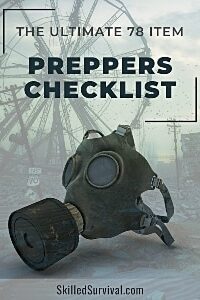
Want a free 78 item preppers checklist?
Enter your email below to instantly download this Complete Checklist PDF. No purchase necessary. 👇 👇Individual Pandemic Preparedness
While having a plan for surviving a pandemic as a community is great, the most important person to protect is numero uno.
The fact that you’re reading this right now means that you are several steps ahead of most.
So here are some additional steps YOU need to take to ensure you survive a pandemic.
Stock Up On Specific Prepper Gear
Pandemic Rated Gas Mask
The odds are, for a disease to reach epidemic global pandemic levels, it must be readily transferable through the air we breathe.
So any unfiltered air will be littered with infectious particles.
Wearing a high-quality gas mask is your first line of defense in such a scenario.
We recommend the Israel Civilian Gas Mask as a budget gas mask that’ll work for most people.
Or, for one of the top-of-the-line gas masks, we recommend the MIRA Safety CM-7M Military gas mask.
Duct Tape and Plastic Drop Cloths
You won’t be able to wear a mask 24 hours a day, seven days a week.
So you need to turn your home into a sealed-up safe zone.
Plastic drop cloths taped over windows, doors, and any other potential leak points will help to create these safe zones in your house.
You can also create small quarantine zones within your entrance/exits.
In these areas, you can create simple procedures for your family to sanitize themselves with sanitation wipes.
And disinfect any personal items with Clorox bleach before entering the interior safe zones.
Eye Goggles
Like lungs, the eyes are one of the most common entry points for pandemic viruses.
If the disease is in the air and your eyes are exposed, it’s a recipe for contracting the illness.
Eye goggles will keep your eyes protected when in an area outside your safe zone or when taking care of sick family members.
Latex Gloves
As humans, we use our hands to do nearly everything.
So our hands are our most common body part for coming into contact with objects.
The objects that may be contaminated.
Having lots of disposable gloves on hand will help prevent you from getting the disease on your hands in the first place.
Tyvek Suits
Some diseases are so contagious and intense that you’ll want to go all out and keep the germs and viruses off your skin.
A properly designed and worn Tyvek suit will keep your skin disease-free.
But not all hazmat suits are created equal.
Make sure you research the best suits to protect you against all contagious diseases.
Here’s our hazmat suits article to help you find the right one.
Bio-Hazzard Bags
A bio-hazard bag is a location dedicated to any disposable item that may have come in contact with a pandemic disease.
Disposable gloves, rags, wipes, needles, etc.
Keep them in bags labeled to prevent accidental exposure to others.
Diapers (buy sizes for all family members)
Depending on the pandemic, humans may have severe diarrhea.
It may also leave the infected too weak to get to a bathroom.
In such situations, you’ll be glad you have a way to contain the mess with diapers.
Vomit Bags
Like diapers, having vomit bags designed for and dedicated to vomit will ensure proper containment of the infected bodily fluids and disposal.
NOTE: You need to buy these items TODAY.
If you try to buy these items after the pandemic spreads, millions will also be trying to buy these items.
There will not be enough supply for everyone.
So if you wait, it could be too late…
Keep Your Body Fit and Healthy
The simplest, most effective way of keeping yourself safe from disease and infection is to STAY HEALTHY.
The stronger your body and the more efficient your immune system, the less chance you get sick and die a horrible death.
Being healthy also means eating well, exercising regularly, going to the doctor for check-ups, staying hydrated, etc.
Besides reducing direct exposure, nothing will help protect you more than staying healthy.
Keep Your Regular Survival Stock Topped Up
Like any disaster scenario, you want to stock up on the necessities for living.
In the previous section, I mentioned having a community supply – an excellent idea, but don’t rely on it completely.
Keep a stockpile of supplies for yourself, and be thorough about the list of things you keep stocked:
- WATER is the most important thing you can store. If the faucets stop working for whatever reason (like if no one is manning the power station due to illness), anyone who doesn’t have water on hand will be in trouble. People should consume 1 gallon per person daily, so supply accordingly.
- Non-perishable survival food is necessary for obvious reasons. Keeping a stash of top sirloin steaks ready for the end of the world would be amazing, except that they’ll all go bad before you get the chance to enjoy them. You may not love canned or dehydrated foods, but they are your best bet for staving off hunger should food become scarce.
- Medicine and medical supplies are useful for obvious reasons. Here is a thorough guide to building a medical kit. The biggest thing to remember about storing medicine is that it expires, and you must keep close tabs on which medications go bad and when so you can replace them.
- Vitamins are also great for boosting immune functions, so keeping an extra tub of multivitamins handy is a good way to prepare for a pandemic.
- Survival gear and tools are always useful, especially when limiting human-human interaction. If the pandemic is at large, and you want to minimize your exposure, it probably isn’t good to have repairmen and other visitors coming and going from your home. As long as the disease is spreading, repairs are a DIY issue.
- Cleaning supplies aren’t something many people think about when preparing for the worst, but they are important! Soaps, sanitizers, disinfectants, and rags are always handy – especially in a pandemic emergency when sanitation is VITAL.
- Gross, as it sounds, having a portable toilet with disposable linings might save you a massive headache should your water stop working. Without a flush feature, your house toilet isn’t going to work for very long. You need to figure out your survival sanitation plan.
- Basic household items become increasingly useful the longer you have to hold out. Ziplock bags, garbage bags, duct, and electrical tape, tissues, toilet paper, paper towels, buckets, and anything useful in day-to-day life will be extremely helpful when you don’t have access to stores.
- Minimize your exposure. As the pandemic sweeps through society killing people off and leaving millions ill, the safest way to live is in solitary.
- Don’t go outside (especially if the disease is airborne) more than necessary.
- Stay away from sick people entirely, and do your best to avoid people in general (even healthy ones) – you never know who might be carrying an illness without displaying symptoms yet.
- Wash your hands, and shower often. Stay clean, and keep your home clean and sanitary – the disease is more likely to infect you if your hygiene is poor.
- Cover any open wounds immediately, disinfect and keep them clean until the injury is healed. Open skin is ripe for infection.
- Rest up! Get a lot of sleep, so your immune system is strong and ready to fight for your life.
- Stay informed. You will probably not make it if you do not hear about a pandemic before it sweeps across your area. Watch the news, read articles, and stay tuned to current events. If you keep yourself informed, you will probably have a longer head-start to prepare when the pandemic strikes. The longer in advance you know about a disease emergency, the higher your chances of survival are – so try to stay on top of it. The CDC and the WHO are excellent resources for monitoring global health situations and threats.
The Final Word
We’ve all seen TV shows and movies where pandemic diseases spread like wildfire. We read stories about them in novels and history books.
They are everywhere in popular culture: in shows like The Walking Dead, bestselling novels like The Stand and comic books, and at least one movie per year like Contagion.
Our culture is seemingly obsessed with the idea of a pandemic spreading and wreaking havoc on our society.
As functions of entertainment, pandemics are great!
But should the fantasy become a reality or a worldwide epidemic disease manifest, it won’t be fun to watch.
People close to you will probably die.
The social order of your community may start to break down into violence, looting, and riots, and anyone who isn’t prepared for all of that will not last very long.
The Black Death is an example of how a disease can quickly cover great distances and leave millions dead.
It took Europeans generations to recover from those seven years of hell.
That pandemic left a permanent stain on history, a scar we will never forget because it was horrifying and apocalyptic.
It left a permanent stain on history, a scar we will never forget because it was so horrific and apocalyptic.
Today there are billions more people on Earth than when the Black Death ran rampant.
And our transportation systems are unimaginably more complex and efficient – the stage is set for an aggressive and rapid pandemic emergency.
It is like a dry, dead forest just waiting for a spark.
How To Survive A Pandemic Action Plan
- Start A Community Conversation
- Develop A Community Pandemic Preparedness Plan
- Buy The Essential Prepper Survival Gear
- Get Your Family On Board and Discuss A Plan To:
- Seal Your Home With Plastic
- Limit Travel
- Check Your Survival Stock Levels (water, food, medical supplies, etc.)
- Practice Sealing Your Home and Wearing Your Pandemic Survival Gear

Prepare, Adapt & Overcome,
P.s. - I just found out 2 out of 3 Americans don’t feel prepared for a 3 day disaster!!!
I guess this goes to show how modern society continues to embrace ‘living a fragile life.’ What’s crazy is… it’s so easy to fix.
To make sure YOU have the basics, watch our FREE training on “10 Simple Steps To Basic Preparedness” that shows you HOW.
Nothing crazy here… this isn’t doomsday prepping... just the basics every responsible adult should have before a disaster strikes.Why You Can Trust Skilled Survival...
Go here now to review a full breakdown of:
- Who We Are
- Our Credentials
- Our Mission
- & Product Recommendations...
Here are a few highlights of our teams credentials & certifications:
- Certified Member of a Mountain Search & Rescue Organization
- Plant Emergency & Safety Leader for a Major Food Manufacturer
- Member of the 10TH Mountain Division Hut Association
- Certifications: Avalanche 1, WFR, CPR
- Official Gear Tester for Numerous Outdoor Gear Companies
- Countless Multiday Backpacking trips into Remote Wilderness
- Bachelor's Degree In Mechanical Engineering
- Bachelor's Degree In Civil Engineering
- Bachelor's Degree In Biomedical Engineering
"It takes 20 years to build a reputation and five minutes to ruin it." - Warren Buffett
We're fully aware that trust is NOT something you GET but is EARNED.
And we'll continue to earn YOUR trust through our forthright and honest approach with each new Blog Post, Guide & Product we create...
P.s - I just took this FREE 60-second 'Readiness Score Quiz'👇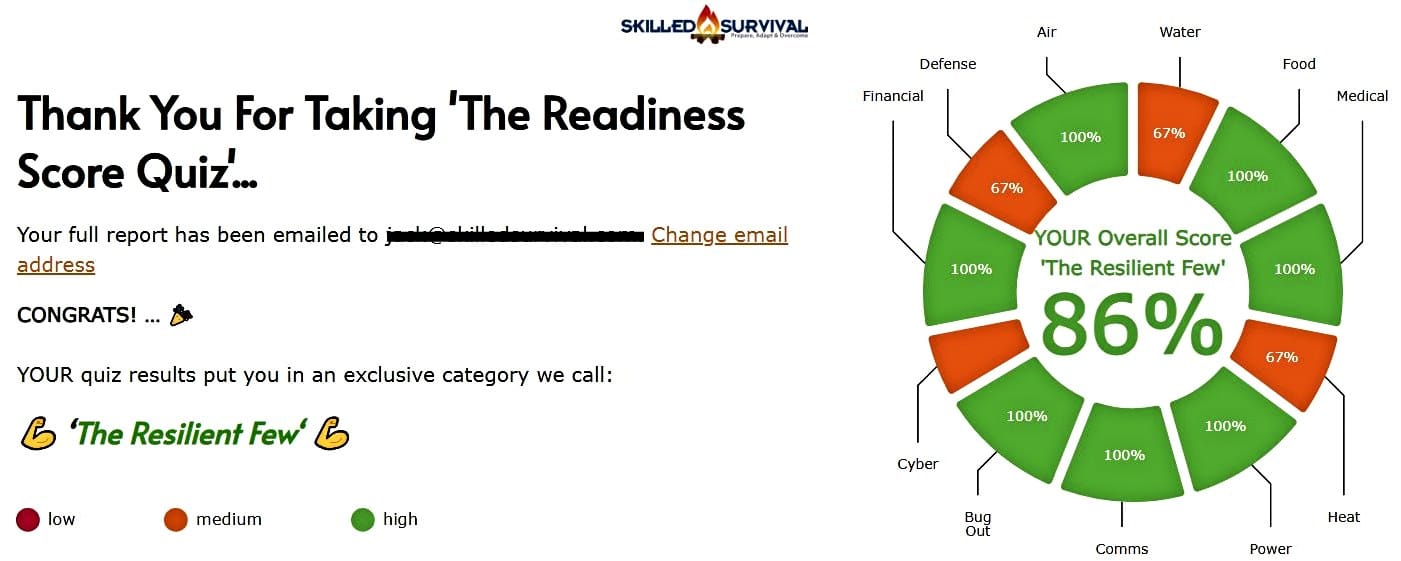
AND... I've still got a few gaps in my preps...🤔 But at least, I'm not part of 'The Fragile Masses'. 👍 Find out where YOU stand by answering a few questions...
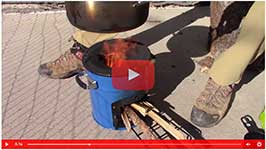
Recommended Reading
Long Term Fuel Storage For Survival Emergencies
Long term fuel storage is crucial in emergencies, but fuels must be stored properly especially long term gasoline storage.
How To Store Seeds For Wise Prepping & Survival
When seed saving and seed storage, you must do it right. Learn how to store seeds so they'll thrive the next planting season.
Common Everyday Carry Mistakes YOU Must Avoid At All Costs
The only person qualified to build YOUR Best Everyday Carry (EDC) is YOU. To do it right, you must avoid these common mistakes and pitfalls.
Strategic Relocation: How To Find A Safe Pace To Live
Use strategic relocation to find a safe, defendable location to call home. Your choice of location WILL determine your survival fate.
Nuclear Fallout Map: Would I Survive A Nuclear Bomb?
Have you seen this nuclear fallout map? Or run a nuclear simulation to see the damage a nuke would do to your city? If not, check this out.
Homestead Survival: How To Master Plan Your Safe Haven
Use this simple 6 homestead survival plan to successfully survive (and thrive) even if the world falls into chaos...
